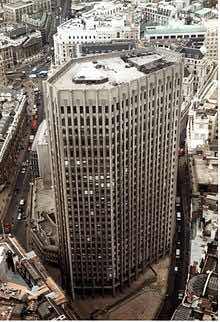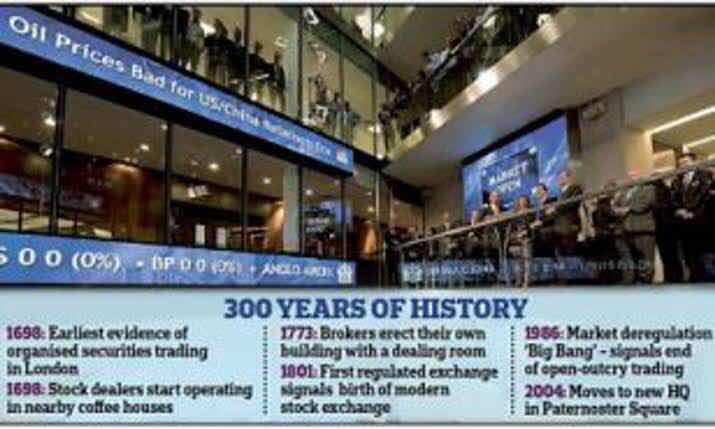Drop ten, turn and face.
Quilty’s Football Yarns 39
County NatWest London Stock Exchange again.
Having originally had, and taken, the opportunity to start and run my own business, by 1986, I decided to wind it up. The Hackney & Bethnal Green Link was no more. Terrie and I had married on Sept 6th 1986 and I was now in need of employment. Back in the early 1970’s I had worked on the London Stock Exchange, leaving in the downturn of 1975. Fortunately, my cousin Johnny Hill was still up in the City and he helped me remake the connection.
At this time, the Stock Market and Banking were undergoing the phenomena of ‘Big Bang’. This basically meant that UK markets were being opened up to foreign competition, having been protected up until this point from outside influence. The response of the UK banking system was to form ‘one stop shop’ Investment Banks. Lloyd’s, Barclays and Nat West all expanded into a wider range of financial services. With a multi-billion shopping list they all acquired various Stock-Broker’s, Stock Jobbers, Merchant Banks, Foreign Exchange and Finance companies. At the same time, many world class financial service providers came to London. HSBC, Bank of America, Saloman’s, Tullette & Tokyo, Swiss Bank and Deusche Bank to name a few.
My new job was to be with Scottish stock-broker Wood Mackenzie, in their settlement’s office up near London Wall. This was a very exciting time to be returning to the City to work. The money was good, bonuses promised and prospects attractive. Johnny was an Equity Market Maker. This was the new name for Stock Jobbers in the new screen-based markets of ‘Big Bang’. Although, I started work for Wood Mackenzie, a whole series of quick paced takeovers took place meaning I went from Hill Samuel to County and then County Nat West in just a few months, without actually changing my seat at work! As ever I was ambitious. I noted that in this new world financial order, "Compliance and Regulation" would be important and more importantly, the whole Stock Exchange dealing culture would need to update. My immediate plan was to study and pass the Securities Industry Examinations. First the Registered Trader and then as Registered Representative. Planning ahead, I saw that if a dealing opportunity arose, I would like to be well placed to take it. The prevailing culture on the Stock Market was still very much ‘fly by the seat of your pants’. I quickly realised that it would need to change as the industry became more professional. Long lunches and drinking at lunch-time would eventually stop. Qualifications would become vital for progression and I gambled correctly.
The screen-based trading system was still in its infancy, but firms were increasingly becoming beholden to computers. My aim was to become like Johnny Hill, a Market Maker. This was someone who acted as a wholesaler for particular stocks, and ‘made a market’ for brokers to trade in. Market Makers did not trade with the public. Five or six firms would make a market as buyers and sellers of particular stocks. Their two-way prices appeared on the screen for brokers to see. They were committed to trade in particular ‘size’ of transaction to maintain liquidity in the market. By making this ‘market making’ commitment the Investment Banks received generous tax treatment in terms of capital gains and stamp duty.
Fortunately, an opportunity arose for me in the dealing room of County Nat West. I’d quickly got to where I wanted to be. In late 1986 Stock Markets around the world were on a bull run. The 'greed is good mentality' was pervasive. As equity traders the boys at County certainly led a busy yet financially rewarding life. I was 31 at this time and was married. My boss, Michael Pauk was a few years younger than me and our whole team were a few years younger than him. The temptation to push on after work was a big one. For instance, there were particular IDB brokers like Tullet & Tokyo who would offer to ‘entertain’ the dealers almost every night. They obviously had big budgets and would literally take the boys out to any event they wanted to go to. Personally, I went with them to the Bugner v Bruno fight at White Hart Lane and Herol Graham v Mike Mccallum World Title at the Royal Albert Hall. Both massive Boxing events they took us to. Obviously, they entertained people because they wanted business pushed their way. Nothing illegal in that but all potentially awkward.
The traditional UK dealing culture came under a lot of pressure as ‘outside’ practitioners came onto the London Stock Exchange. The old ‘my word is my bond’ adage now had an asterisk next to it. One day a sharp broker got me to quote a price and next day claimed he was a seller rather than a buyer. I had to go down and listen to the telephone tape to check what was said. It was very nerve-racking. I turned out to be correct, but it was a lesson learned. My boss warned me to watch out for verbally acrobatic shysters! People often ask about the pressure of market making. Two stories illustrate its ups and downs. One day I was asked to sit in for a few days to trade someone else's stocks. Unfortunately the market was awful and in one stock we had about 15 million shares, also being the company broker. Every time they ticked down our P&L showed us losing money. To make it worse, ‘friends’ often asked us to buy more at an improved price! Pressure built on me, my discomfort a spectator sport in the office. In the end I offered 5 million at a low price locking in a loss. The ache in the neck of being in such a situation was unpleasant.
On the flip side one day I hooked up a big buyer and seller all day long making a fortune for County in the process. As the market slowed after the 87’ crash I took more interest in the financial side of the companies I traded. This stood me in good stead with accounting later life.
National Westminster Bank, who owned my firm County, were the UK’s largest Bank in 1986. In five years they have given up this position and were actually taken over by Royal Bank of Scotland, a big fall from grace. There were two main reasons for this.
The first revolved around a company takeover they facilitated in the boom times of 1987. British firm Blue Arrow were bidding for Manpower a larger global Employment Services firm. This take-over involved a share offer. The media said’ In 1987, Blue Arrow was at the centre of a financial scandal when employees of National Westminster Bank's investment arm, County NatWest, covered up a failed issue of £873m’ As the Company Broker, County were responsible for announcing its success or failure. In the event only 50% of Blue Arrow shares were placed in the market. County announced that all 100% had been sold creating a ‘false’ market. Somehow, County Nat West decided to hide what amounted to half the company shares in various divisions of the banks corporate structure. Of course, this was soon discovered the ramifications causing heads to roll all the way to the top.
A second scandal indirectly involved me and the dealers in my dealing area. Because Investment Banks sometimes handle the affairs of multiple business’s, they create information divisions called ‘Chinese Walls’, This, is supposed to protect sensitive information. On this particular, quiet day, one of our corporate analysts was taking a short cut through our dealing room. She had been to a company briefing and had important ‘good news’, with regard to a business NatWest represented. This news was ten minutes away form being announced into the market. Co-incidently, she got called for a phone call, as she walked past our dealing desk, the one that dealt in those shares! Our two market maker dealers, sitting nearby, overheard her conversation. Hearing what she said they decided to try to reverse the firms ‘short’ position to avoid losing millions of pounds. Immediately, they called me and the rest of the other dealers to get on the phones to ‘buy back’ our ‘short position’. This was done in three minutes and we managed to neutralise the short position saving the firm big money. The only thing was, the 'announcement' still wasn’t out yet. The guys then decided to go around and take out the market again, actually putting ourselves in a winning 'long' position. Next morning the Stock Exchange received numerous complaints from other market-makers that we had front rum the market on sensitive information, which was true! Panicking, Nat West came to question the dealers and suspended them immediately. Little did we all know but not only were all phone calls recorded but even the dealing area was ‘miked-up’ 24 hours a day. Every word was recorded. A year later the two dealers appeared on Insider Trading charges in the City. The judge asked them how much they had made personally from the deals. When they said nothing, which was correct, the judge dismissed the charges. Nat West was forced to re-instate or compensate them, doing the latter.
While 1987 had been a great year for the market, by October, things started to unravel. Black Monday in London was awful in terms of weather. a massive storm preventing many getting into the City. I lived locally and walked in. This day was to be the first technology based Stock Exchange crash. Things were so bad that every time you answered the phone it was to buy shares going further south. Then in the chaos of a crashing market, suddenly our whole dealing system crashed. We couldn’t see our screens so couldn’t answer the phones! It was estimated that this actually saved County Natwest 20m pounds in three hours. Comically, around 11.00am with our screens still blank, the Bank of England sent a messenger to our offices in Drapers Gardens to see what was happening. The conversation went something like this:
After a knock on the door.
Messenger.” I’m here from the Bank of England”.
NatWest Boss. “Yes, what do you want?”
Messenger: “We need to know why you are not answering your phones. As Market Makers you have an obligation”
NatWest Boss. “Sorry, our computer system has crashed, we can’t see our positions”
Like a naughty boy we had been told off!
The market was never the same again after the 1987 Crash. It was a world wide phenomena but certainly hit NatWest hard. I survived the first two rounds of redundancy. This in itself as stressful. On one occasion we lost 40 staff. On the previous occasion when I had survived the cut, I have memories of seeing those flashing phones and screens at empty dealing desks that stay with me. I remember telling the boss that no one was left on the Engineering desk, all the team had gone. He asked me to take calls there for the afternoon. It was a bit longer, as it turned out, I was there for the next month! Corporate planning is not all it is made to be!.
Eventually, my own day came in early January 1990. I recently watched the film Margin Call. The beginning portrays a scene within an Investment Bank pre-GFC, where a round of retrenchment is just about to begin. Dealers looking up anxiously from their desks as silently HRM staff circle the room tapping losers of the lottery, on the shoulder. A gloomy procession snakes across the floor as those selected go to meet their truncated fate.
Spookily, this was exactly my fate in January 1990 as I, and 80 others were let go by County NatWest Equities in London. What is even more remarkable to me is that the script has not changed in 30 years! For me that day we were held for what seemed an age before being shuffled in to meet two HR people. As in the film, I was told that this was nothing to do with me or my performance, it was just a symptom of the time, three rough years after the 87' crash. Basically, an offer I could not refuse was made. Statutory remuneration payments, an ex-gratia payment amounting a substantial 'we are getting rid of you and feel guilty about it' payment, extended mortgage relief at 3%, the market rate was 14% at the time, and a week’s outplacement advice on finding a new career.
As in the movie, the brutal reality sting came when a security guard appeared at the office door. The instruction consisted of "Mr Quilty, this gentleman is under instructions to escort you back to your desk. Please give him your security pass, he will give you a black plastic bag. (In movie they have graduated to cardboard boxes) You have ten minutes to clear your desk. You will be escorted from the building and will not be allowed to return. Mr Quilty please understand that the firm bears you no ill feeling, this decision is not personal you are one of eighty staff being let go today"
Watching that scene was personally memory evoking. It dug up all sorts of feelings, long gone, buried in time. Immediately I'd say that it was a shock but no surprise, I had survived the two previous rounds of retrenchment at Nat West. That in itself had been eerie because like in the film Margin Call, the surviving supervisors also call out to 'lift the troops' morale saying you are the dealers chosen to take the firm forward. Whether you are going or staying in such a situation it illustrates how we give too much credence to bosses and their ability to 'plan strategically forward'. I was fortunate that morning in January 90' because I had existing teaching experience, most of the other 80 dealers had nothing to fall back on.
As it turns out I sensed something was going on and had spoken to a teaching mate Martin Rabenau about possibly needing work. He he said he might be needing someone down at St Paul’s Way in Bow. When I called him on Friday to tell him I’d lost my job he said “Ok , come here on Monday”. I said, “Can we make it a week later, I’m feeling tired and emotional!”
I went out immediately and bought two Addidas ‘shell track suits’ and within a week had given over my City clothing and ties, for teaching PE to Bangladeshi kids in Bow.




